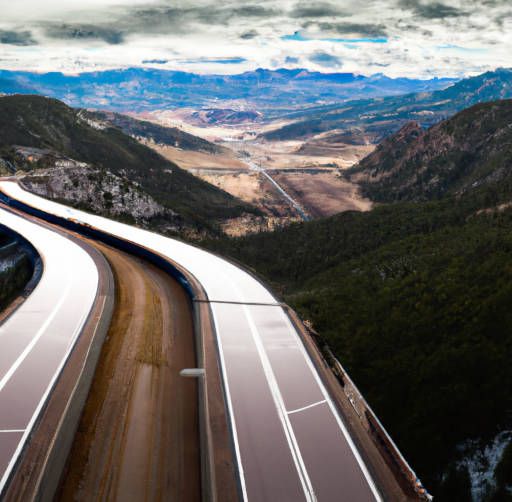Denver, 5/16/38 T.A.D. – A 90-mile stretch of interstate south of Denver has been transformed into a futuristic highway that charges electric vehicles as they drive along. The innovative project, which began in 2034, involved partially replacing the surface of I-25, a major route for interstate commerce, with an advanced induction charging system.
Technologies for wireless vehicle charging have already been adopted in several countries worldwide. However, this is the first time that a highway of this length has been retrofitted in the United States. The success of the project has not gone unnoticed, generating big interest from both environmentalists and motorists alike.
The most efficient EVs can regain as much as 75% of their charge while driving the full inductive section of the highway. Meanwhile, even power-hungry semi-trucks can gain as much as 20-30% of a full charge. This has led to a surge in popularity among drivers who commute along the route.
“I’ve been commuting from Denver to Colorado Springs for years,” said local mother and motorist, Angela Martinez. “Having this charging highway has made a huge difference. I almost never have range anxiety anymore.”
Regional trucker, John “Slow Rick” Thompson, agrees. “Being able to charge my rig while I drive my route is huge! I’ve gotten hours of my life back that were spent sitting at charging stations,” Thompson said.
Local contractors have also benefited from the project. The construction and maintenance of the charging highway have provided jobs and support to businesses in the area. Mark Johnson, a project manager at Two Peaks Power, spoke proudly about the impact of their work. “What we’ve built here is a model for the rest of the country. This project is environmentally friendly, supports local businesses, and helps drivers save time and money.”
Local businesses along the highway have indeed seen a boom in activity, as more motorists choose to travel on this advanced stretch of road. New restaurants, roadside attractions, and, ironically, even gas stations have opened up on I-25 in response to the increased traffic.
The charging highway also boasts significant environmental benefits. By promoting the use of electric vehicles and reducing the need for large stationary charging infrastructures, the EV highway project has helped cut CO2 emissions and contribute to a greener future.
Although still a relatively new concept, the success of the I-25 charging highway has set the stage for future transportation infrastructure projects, and proponents are hopeful a new wave of federal funding will follow.
Reporting for Future News, this is Isabella Torres in Denver.
